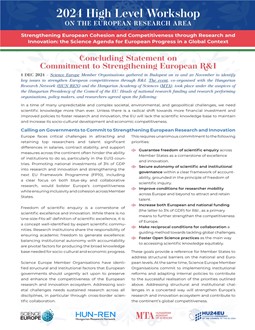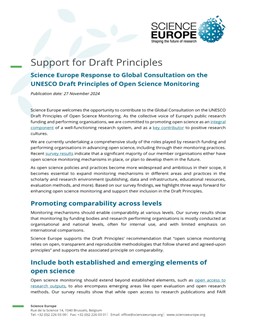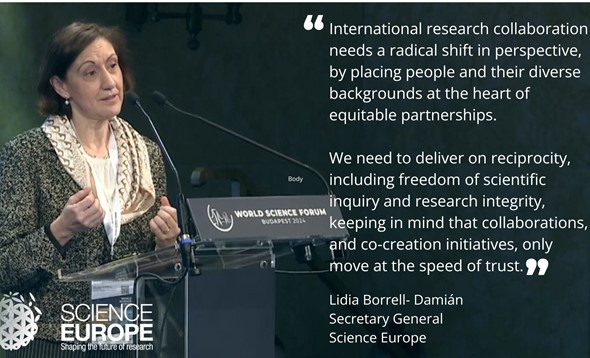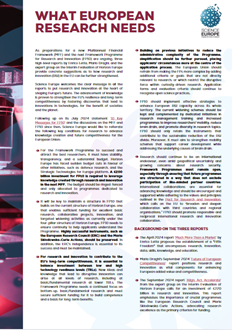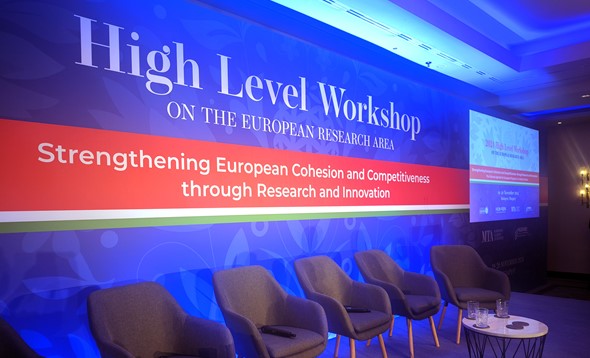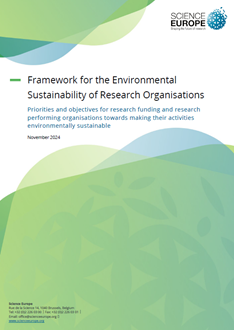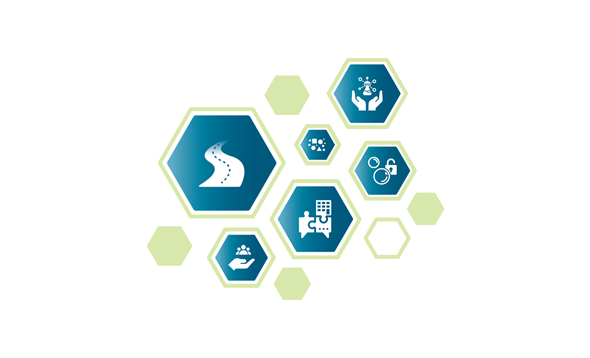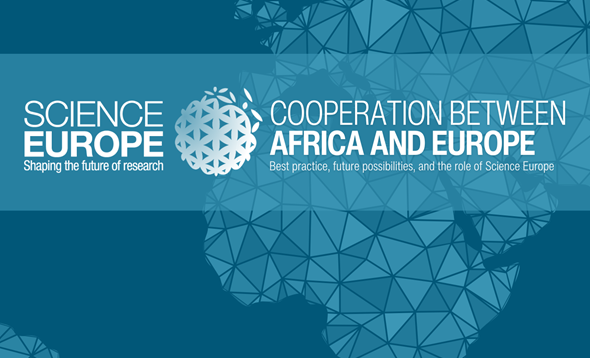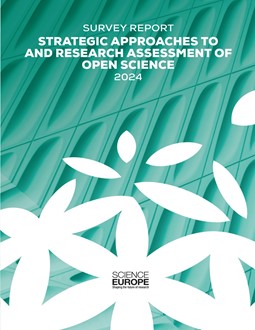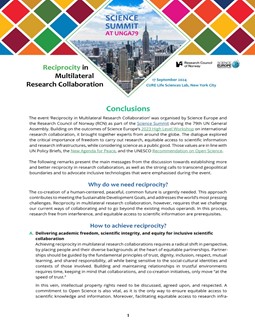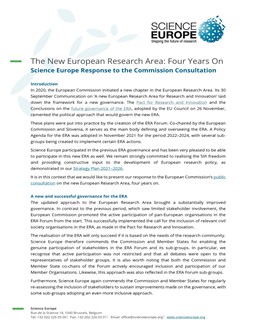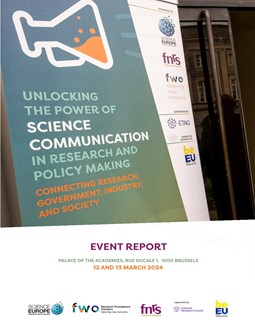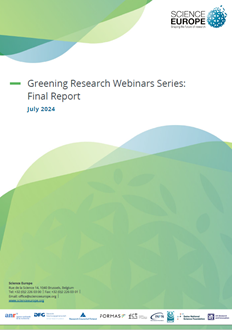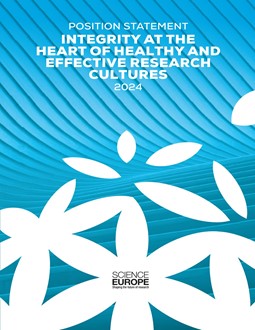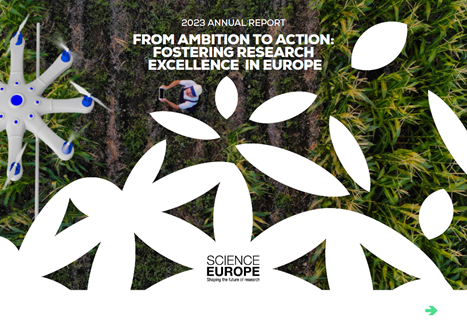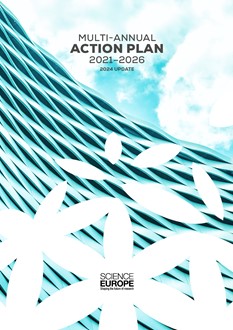Member-only content is available on this page. Please log in to view this content.

What's going on?
570 item(s) found
Concluding Statement on Commitment to Strengthening European R&I
This statement presents the key conclusions from the 2024 High Level Workshop on 'Strengthening European Cohesion and Competitiveness through Research and Innovation' and a set of priorities for achieving this.
Support for UNESCO Draft Principles on Open Science Monitoring
Science Europe responds to the global consultation on the UNESCO Draft Principles on Open Science Monitoring. The principles are a step in the right direction, aligning with the priorities and practices of Science Europe's Member Organisations.
What European Research Needs
Science Europe calls for a €200 billion investment in FP10, dedicated solely to R&I, ensuring continuity and sufficient funding for basic research, collaborative projects, and innovation. Key instruments like the European Research Council (ERC) and Marie Skłodowska-Curie Actions must be preserved, with a balanced focus on low and high technology readiness levels.
High Level Workshop on ERA 2024
The 2024 High Level Workshop on ERA was co-organised with HUN-REN and MTA, with the support of the Hungarian Ministry of Culture and Innovation. It dealt with 'Strengthening European cohesion and competitiveness through research and innovation: the science agenda for European progress in a global context'.
Framework for the Environmental Sustainability of Research Organisations
The present Framework introduces strategic directions for Science Europe Member Organisations to share practices and coordinate efforts. In addition to leading by example, the objective is to achieve systemic change – pursuing environmental sustainability of research organisations’ activities – including mitigating climate impacts. Other important questions, such as funding for research on sustainability, as well as the economic and social dimensions of sustainability, fall outside of the scope of this Framework and may be the subject of future actions.
Workshop on Attractive Careers in Research: the expectations & roles of different stakeholder groups
The workshop on Attractive Careers in Research explored the common and different expectations for careers in research by different stakeholder groups, and the opportunities for action that exist based on these expectations. Existing good practice examples from within and outside of academia were presented and used as inspiration.
Cooperation between Africa and Europe – best practice, future possibilities, and the role of Science Europe
The first workshop in Tallinn on 30 October, following the European GRC Regional Meeting, will focus on Africa-Europe co-operation. Selected African and European countries will share existing good practices and opportunities for future co-operation.
2024 GRC European Regional Meeting
Heads of European research organisations will meet at this Regional Meeting of the Global Research Council to discuss European contributions to the 2025 Annual Meeting. Similar meetings take place in the four other GRC regions: Americas, Asia–Pacific, Middle East/North Africa, and Sub-Saharan Africa.
Launch of the Science Europe Survey Report on Open Science and Research Assessment
Science Europe launched the report of its membership survey on the role of research funding and performing organisations in advancing open science and its links to research assessment. It reveals their strategic approaches and activities to evaluate, monitor, and collect evidence on research.
Survey Report Strategic Approaches to, and Research Assessment of, Open Science
This report analyses the role of public research funding and performing organisations in Europe in the shifting landscape of open science and research assessment reform. The findings demonstrate how Science Europe's Member Organisations actively shape and contribute to these developments.
Conclusions of Reciprocity in Multilateral Research Collaboration event
Science Europe and RCN organised an event on reciprocity in international research collaboration to explore the critical importance of academic freedom, equitable access to scientific information and infrastructures. The conclusions highlight the need for a human-centered approach and the value of diverse knowledge systems.
Joint Statement on Marie Skłodowska-Curie Actions
As Europe navigates unprecedented challenges and exciting opportunities, the need to invest in the Marie Skłodowska-Curie Actions is clearer than ever. MSCA nurtures talent, fosters groundbreaking research, strengthens global collaborations, and has a key role in driving economic growth and securing Europe’s competitive edge in a rapidly evolving global landscape.
Science Europe Response to the European Commission Consultation on the New ERA: Four Years On
Science Europe considers the 2021–2024 period a major step forward for the European Research Area due to its more inclusive and successful governance. There are still several areas that need improvement, however, including the ERA's contribution to key EU policy areas.
Reciprocity in Multilateral Research Collaboration
Science Europe and the Research Council of Norway (RCN) organised an event on reciprocity in multilateral research collaboration during the Science Summit at the 79th UN General Assembly. The objective was to address challenges to equitable and reciprocal global scientific collaboration.
Developing and Aligning Policies on Research Software: Recommendations for RFOs and RPOs
This document highlights research software as an emerging element of open science policies and practices and provides recommendations for research funding and research performing organisations on developing and aligning related policies.
Report of High-level Conference 'Unlocking the Power of Science Communication in Research and Policy Making'
This report summarises the High-level Conference on Science Communication organised by Science Europe, FWO, and FNRS. The event emphasised the role of science communication, the importance of integrating it into research programmes and policies, and providing support for those engaging in it.
Greening Research Webinars Series: Final Report
This report summarises the main lessons learned from three webinars on greening research and proposes key messages for the next steps. A summary of each webinar's contents is presented; common lessons and key messages from the whole series are jointly discussed in the final section.
Integrity at the Heart of Healthy and Effective Research Cultures
Research integrity is a cornerstone of robust and reliable research systems, and is linked to healthy research cultures, attractive working environments, and the collective goal to support high-quality research. This statements reaffirms its importance and offers recommendations to research organisations for further action.
Announcing the Global Diamond Open Access Alliance
Join this UNESCO webinar that will introduce and officially announce the Global Diamond Open Access Alliance, highlighting its vision, mission, and objectives, and to engage stakeholders in a collaborative effort to promote Diamond Open Access.
10 Key Messages for the 10th EU Framework Programme for Research and Innovation (FP10)
This position paper discusses the successes and challenges of Horizon Europe and proposes ways forward to increase investment in R&I, while preserving academic freedom, open science, international collaboration, and R&I integration as foundational principles for the upcoming Framework Programme for Research and Innovation (FP10).
From Ambition To Action: Fostering Research Excellence In Europe - 2023 Annual Report
2023 proved to be another landmark year for Science Europe: building on the achievements of the previous year and setting the direction for new approaches in vital areas of research policy.
Multi-annual Action Plan 2021-2026
This Multi-annual Action Plan proposes a series of framework actions to guide the implementation of the Science Europe Strategy Plan 2021–2026 in line with the association's updated vision, mission, values, and strategic priorities. The Action Plan was updated in June 2024.
Greening Research Webinar Series
Science Europe's Greening Research Webinar Series sought to raise awareness, discuss solutions, and empower action to reduce the environmental impact of research activities by exploring its footprint, addressing challenges, and offering actionable steps for the future.
Research Matters Open Letter: A call to strengthen research and innovation in Europe
Science Europe has joined other research and higher education organisations in a call to increase and strengthen investment for research and innovation at European and national level and protect R&I budgets, as part of the Research Matters campaign.

